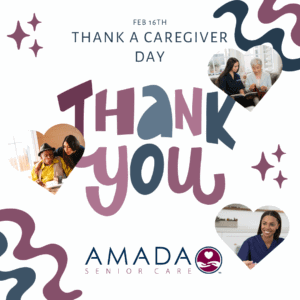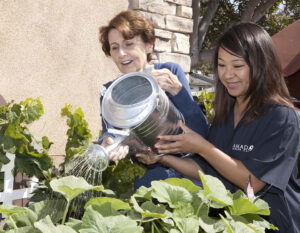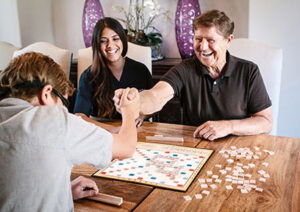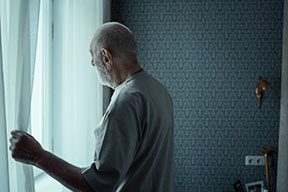“Caregivers are the unsung heroes of the healthcare system.
They are the glue and the heart of care.”
~ Dr. Ronald Adelman, Co-Chief of the Division of Geriatrics
and Palliative Medicine at the New York-Presbyterian Hospital
and Weill Cornell Medical Center
The golden years should be a time of comfort and security, a season to enjoy the fruits of one’s lifelong labors. However, this stage of later life also introduces new challenges, particularly relating to the safety and well-being of our beloved seniors. Caregivers – the unsung heroes in the lives of seniors and their families – play a critical role in ensuring safety and enhancing the quality of life for older adults and seniors.
National Caregivers Day, also known as “Thank a Caregiver Day”
Today, the third Friday of February, is set aside to celebrate family caregivers, paid caregivers and healthcare professionals, particularly those who are assisting seniors requiring long-term care or hospice care. Given that nearly 70% of seniors aged 65 and older will need long-term care at some point in their lives, the role of a caregiver not only is invaluable but also essential.
long-term care or hospice care. Given that nearly 70% of seniors aged 65 and older will need long-term care at some point in their lives, the role of a caregiver not only is invaluable but also essential.
According to an analysis of US Census data conducted by The Washington Post, about “half of the 5.9 million Americans age 85 and older are living with family, including spouses and adult children, while more than 40 percent live alone, including in independent living or assisted-living facilities. A quarter live in multigenerational households, with people of two or more generations under the same roof, and about 8 percent live in nursing homes or memory care facilities.”
Creating a Safe Living Environment for Aging in Place
One of the primary roles of a caregiver is to ensure that the home environment is safe for seniors. This involves making necessary modifications to prevent falls, a leading cause of injury among older adults. Caregivers assess the living space for hazards such as loose rugs, cluttered walkways, and inadequate lighting, and make adjustments to mitigate these risks. They also equip bathrooms with grab bars and non-slip mats and ensure that commonly used items are within easy reach to foster a safe and comfortable living space.
Medication Reminders for Seniors
As individuals age, the list of prescribed medications often grows longer, increasing the risk of medication errors and adverse drug interactions. Caregivers play a crucial role in medication management, ensuring that seniors take their medication as prescribed. They help organize medications, set reminders, and watch for side effects, serving as an extra layer of protection against the complexities of medication management in older adults.
Prescription medication or vitamin supplements, staying current with meds can mean the difference between a healthy life and decline or hospitalization that results from neglectful medication management.
Assisting with Senior Nutrition and Hydration
Proper nutrition and hydration are cornerstones of good health at any age, but they become even more critical for older adults. Caregivers ensure that seniors receive balanced meals that meet their nutritional needs and preferences. They pay close attention to hydration, recognizing that seniors are more susceptible to dehydration, which can exacerbate chronic conditions and impair cognitive function.
Exercise to Maintain Senior Physical Health
For adults, the National Institute on Aging (NIA) recommends 150 minutes a week (2.5 hours) of moderate intensity aerobic exercise (brisk walking; jogging; cycling; fast dancing), with strength training at least two days a week. That said, the same guidelines state that any exercise is better than none, so if a senior doesn’t consistently hit the mark, some semblance of movement is still recommended. This is where, following a healthcare provider’s sanctioned plan, trained caregivers can make a difference in the quest for independence by encouraging a client to get up, out, and move – even participating for support in a fun physical activity.
Assistance with Personal Care and Preserving Dignity
For many seniors, the decline in physical abilities makes daily personal care tasks challenging. Caregivers provide the assistance needed for activities such as bathing, dressing, and grooming. This support not only helps maintain a sense of dignity and personal well-being but also prevents injuries that can occur when older adults attempt these tasks on their own.
In order for our senior loved ones to feel dignified, they need to be treated like an individual. They are not a number nor a patient in a gown. They are individuals with their own beliefs, styles, and experiences. Their individualism needs to be acknowledged, and this is where caregivers can provide that respect and communicate with seniors about their preferences.
Senior Companionship for Emotional Health
In addition to physical safety, the emotional and social well-being of seniors is paramount. Loneliness and isolation can lead to depression and a decline in health. Caregivers offer essential companionship, engaging seniors in conversations, activities, and outings that keep them connected to the world around them. This emotional support is a critical aspect of safety, promoting mental health and a sense of belonging.
Caregivers Act as a Liaison to a Senior’s Healthcare Providers
Caregivers act as vital links between seniors, their families, and healthcare providers. They communicate health changes, share concerns, and escort seniors to medical appointments. This role is particularly crucial when families live at a distance or when seniors have complex health conditions that require coordinated care.
The role of caregivers in ensuring the safety and well-being of older adults is multifaceted and goes beyond mere assistance with daily activities. It involves creating a safe living environment, managing medications, ensuring proper nutrition, providing personal care, offering companionship, and facilitating healthcare. To seniors and their families, caregivers are not just helpers; they are lifelines that enable older adults to navigate the challenges of aging with dignity and grace.
Understanding and supporting the vital role of caregivers strengthens the continuum of care for seniors, ensuring that every aspect of their well-being is addressed. Together, families, caregivers, and healthcare providers create a holistic safety net that allows our seniors to thrive in the comfort of their homes, surrounded by care and love.
To all caregivers out there, we see you, and we appreciate the invaluable work you do every day to keep our seniors safe. Thank you.
Having a candid discussion about the challenges of aging is the first step to ensuring aging doesn’t equate to a loss of independence. If you think you or a loved one may benefit from an in-home caregiver, don’t hesitate to contact us at Amada Senior Care for a free care needs consultation. Click here to find an Amada Senior Care location near you.















